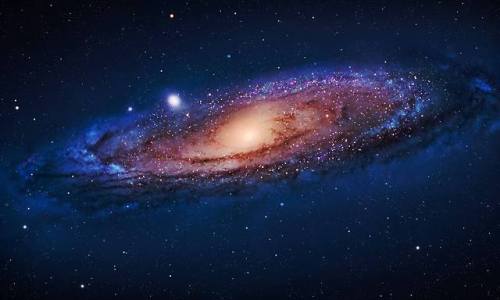Monstrous-mind - The Monster Mind

More Posts from Monstrous-mind and Others
Astronomy From 45,000 Feet
What is the Stratospheric Observatory for Infrared Astronomy, or SOFIA, up to?

SOFIA, the Stratospheric Observatory for Infrared Astronomy, as our flying telescope is called, is a Boeing 747SP aircraft that carries a 2.5-meter telescope to altitudes as high as 45,000 feet. Researchers use SOFIA to study the solar system and beyond using infrared light. This type of light does not reach the ground, but does reach the altitudes where SOFIA flies.

Recently, we used SOFIA to study water on Venus, hoping to learn more about how that planet lost its oceans. Our researchers used a powerful instrument on SOFIA, called a spectrograph, to detect water in its normal form and “heavy water,” which has an extra neutron. The heavy water takes longer to evaporate and builds up over time. By measuring how much heavy water is on Venus’ surface now, our team will be able to estimate how much water Venus had when the planet formed.

We are also using SOFIA to create a detailed map of the Whirlpool Galaxy by making multiple observations of the galaxy. This map will help us understand how stars form from clouds in that galaxy. In particular, it will help us to know if the spiral arms in the galaxy trigger clouds to collapse into stars, or if the arms just show up where stars have already formed.

We can also use SOFIA to study methane on Mars. The Curiosity rover has detected methane on the surface of Mars. But the total amount of methane on Mars is unknown and evidence so far indicates that its levels change significantly over time and location. We are using SOFIA to search for evidence of this gas by mapping the Red Planet with an instrument specially tuned to sniff out methane.

The plumes, illustrated in the artist’s concept above, were previously seen in images as extensions from the edge of the moon. Next our team will use SOFIA to study Jupiter’s icy moon Europa, searching for evidence of possible water plumes detected by the Hubble Space Telescope. The plumes were previously seen in images as extensions from the edge of the moon. Using SOFIA, we will search for water and determine if the plumes are eruptions of water from the surface. If the plumes are coming from the surface, they may be erupting through cracks in the ice that covers Europa’s oceans. Members of our SOFIA team recently discussed studying Europa on the NASA in Silicon Valley Podcast.

This is the view of Jupiter and its moons taken with SOFIA’s visible light guide camera that is used to position the telescope.

🦖🦕🌎☄️🍂

If you’ve visited the Museum, you’re certainly familiar with today’s Fossil Friday feature: the Barosaurus and Allosaurus in the Rotunda! Rising 50 ft (15 m) above the ground, it’s the world’s tallest freestanding dinosaur mount. In this scene, a Barosaurus rears up to defend her young from an Allosaurus. How does the huge skeleton of Barosaurus—whose name means “heavy reptile”—stay up? The Barosaurus is built from casts of real fossil bones, while the originals are housed in the Museum’s collections. Real fossil bones would be too heavy to support this way.
Photo: D. Finnin / © AMNH

The Milky Way’s long-lost sibling finally found
Scientists at the University of Michigan have deduced that the Andromeda galaxy, our closest large galactic neighbor, shredded and cannibalized a massive galaxy two billion years ago.
Even though it was mostly shredded, this massive galaxy left behind a rich trail of evidence: an almost invisible halo of stars larger than the Andromeda galaxy itself, an elusive stream of stars and a separate enigmatic compact galaxy, M32. Discovering and studying this decimated galaxy will help astronomers understand how disk galaxies like the Milky Way evolve and survive large mergers.
This disrupted galaxy, named M32p, was the third-largest member of the Local Group of galaxies, after the Milky Way and Andromeda galaxies. Using computer models, Richard D'Souza and Eric Bell of the University of Michigan’s Department of Astronomy were able to piece together this evidence, revealing this long-lost sibling of the Milky Way. Their findings were published in Nature Astronomy.
source

🔭🌃🌌🐈🍂🍁

First Ever Image of a Multi-Planet System around a Sun-like Star Captured by ESO Telescope
The European Southern Observatory’s Very Large Telescope (ESO’s VLT) has taken the first ever image of a young, Sun-like star accompanied by two giant exoplanets. Images of systems with multiple exoplanets are extremely rare, and — until now — astronomers had never directly observed more than one planet orbiting a star similar to the Sun. The observations can help astronomers understand how planets formed and evolved around our own Sun.
The two gas giants orbit their host star at distances of 160 and about 320 times the Earth-Sun distance. This places these planets much further away from their star than Jupiter or Saturn, also two gas giants, are from the Sun; they lie at only 5 and 10 times the Earth-Sun distance, respectively. The team also found the two exoplanets are much heavier than the ones in our Solar System, the inner planet having 14 times Jupiter’s mass and the outer one six times.
Source
🍂🍁📚☕🐈🎃🍁🍂

🍁🍂🎃🍂🍁

october by OneEyedJax on Flickr.
🔭🌃🌌

Alnitak Region with the Horse Head and Flame Nebulae
by Warren Keller
-
 lazne-slike-o-ljubavi liked this · 5 years ago
lazne-slike-o-ljubavi liked this · 5 years ago -
 sinestezijaa liked this · 5 years ago
sinestezijaa liked this · 5 years ago -
 emanate-light reblogged this · 5 years ago
emanate-light reblogged this · 5 years ago -
 cc-1313 reblogged this · 5 years ago
cc-1313 reblogged this · 5 years ago -
 nekonightwing reblogged this · 5 years ago
nekonightwing reblogged this · 5 years ago -
 nekonightwing liked this · 5 years ago
nekonightwing liked this · 5 years ago -
 itsanelectricblueberry liked this · 5 years ago
itsanelectricblueberry liked this · 5 years ago -
 leafloving reblogged this · 5 years ago
leafloving reblogged this · 5 years ago -
 brooklynbryden reblogged this · 5 years ago
brooklynbryden reblogged this · 5 years ago -
 iloveyoulikeilovetea reblogged this · 5 years ago
iloveyoulikeilovetea reblogged this · 5 years ago -
 sorceress-stoned liked this · 5 years ago
sorceress-stoned liked this · 5 years ago -
 ilariadclr liked this · 5 years ago
ilariadclr liked this · 5 years ago -
 loopingchamp liked this · 5 years ago
loopingchamp liked this · 5 years ago -
 kweenamann liked this · 5 years ago
kweenamann liked this · 5 years ago -
 fireandcake liked this · 5 years ago
fireandcake liked this · 5 years ago -
 its-xana-98-blog liked this · 5 years ago
its-xana-98-blog liked this · 5 years ago -
 ablueberryblogs liked this · 5 years ago
ablueberryblogs liked this · 5 years ago -
 thannn-iaaa reblogged this · 5 years ago
thannn-iaaa reblogged this · 5 years ago -
 thannn-iaaa liked this · 5 years ago
thannn-iaaa liked this · 5 years ago -
 chicagok liked this · 5 years ago
chicagok liked this · 5 years ago -
 sassynickeltrashhands liked this · 5 years ago
sassynickeltrashhands liked this · 5 years ago -
 missglitzerbunt-blog liked this · 5 years ago
missglitzerbunt-blog liked this · 5 years ago -
 khlona reblogged this · 5 years ago
khlona reblogged this · 5 years ago -
 heyhoneyrae reblogged this · 5 years ago
heyhoneyrae reblogged this · 5 years ago -
 skinandmischief reblogged this · 5 years ago
skinandmischief reblogged this · 5 years ago -
 skinandmischief liked this · 5 years ago
skinandmischief liked this · 5 years ago -
 danielledreamsthedayaway liked this · 5 years ago
danielledreamsthedayaway liked this · 5 years ago -
 rainbowbiscuitino reblogged this · 5 years ago
rainbowbiscuitino reblogged this · 5 years ago -
 rainbowbiscuitino liked this · 5 years ago
rainbowbiscuitino liked this · 5 years ago -
 autumnrainsarethebestrains reblogged this · 5 years ago
autumnrainsarethebestrains reblogged this · 5 years ago -
 snowwhite76 liked this · 5 years ago
snowwhite76 liked this · 5 years ago -
 cat-forrest liked this · 5 years ago
cat-forrest liked this · 5 years ago -
 buffy-the-assbutt-slayer reblogged this · 5 years ago
buffy-the-assbutt-slayer reblogged this · 5 years ago -
 bunnyshowwhytho liked this · 5 years ago
bunnyshowwhytho liked this · 5 years ago -
 snowypineboughs reblogged this · 5 years ago
snowypineboughs reblogged this · 5 years ago -
 ryvenchan liked this · 5 years ago
ryvenchan liked this · 5 years ago -
 qoalemantux reblogged this · 5 years ago
qoalemantux reblogged this · 5 years ago -
 ericleegarza liked this · 5 years ago
ericleegarza liked this · 5 years ago -
 witchyteacups reblogged this · 5 years ago
witchyteacups reblogged this · 5 years ago -
 au-gusto liked this · 5 years ago
au-gusto liked this · 5 years ago
My ambition is handicapped by laziness. -C. Bukowski Me gustan las personas desesperadas con mentes rotas y destinos rotos. Están llenos de sorpresas y explosiones. -C. Bukowski. I love cats. Born in the early 80's, raised in the 90's. I like Nature, Autumn, books, landscapes, cold days, cloudy Windy days, space, Science, Paleontology, Biology, Astronomy, History, Social Sciences, Drawing, spending the night watching at the stars, Rick & Morty. I'm a lazy ass.
222 posts
